 Petzlover
Petzlover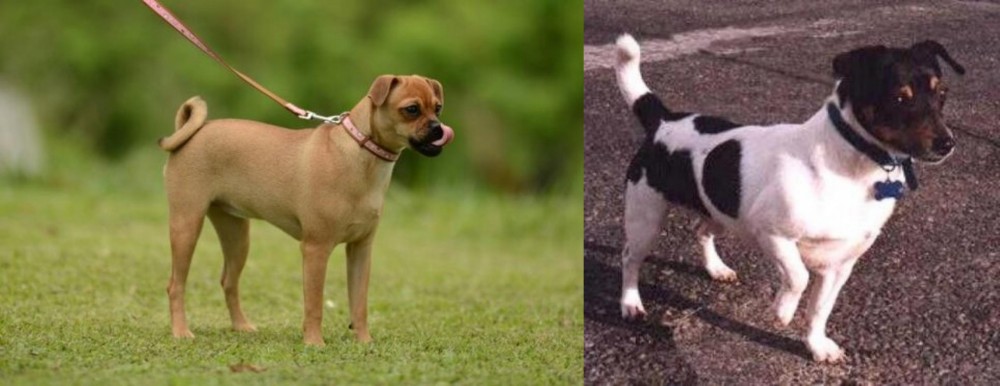 Both Muggin and Teddy Roosevelt Terrier are originated from United States. Muggin may grow 22 cm / 8 inches shorter than Teddy Roosevelt Terrier. Muggin may weigh 11 kg / 25 pounds more than Teddy Roosevelt Terrier. Both Muggin and Teddy Roosevelt Terrier has almost same life span. Muggin may have more litter size than Teddy Roosevelt Terrier. Muggin requires High Maintenance. But Teddy Roosevelt Terrier requires Moderate Maintenance
Both Muggin and Teddy Roosevelt Terrier are originated from United States. Muggin may grow 22 cm / 8 inches shorter than Teddy Roosevelt Terrier. Muggin may weigh 11 kg / 25 pounds more than Teddy Roosevelt Terrier. Both Muggin and Teddy Roosevelt Terrier has almost same life span. Muggin may have more litter size than Teddy Roosevelt Terrier. Muggin requires High Maintenance. But Teddy Roosevelt Terrier requires Moderate Maintenance
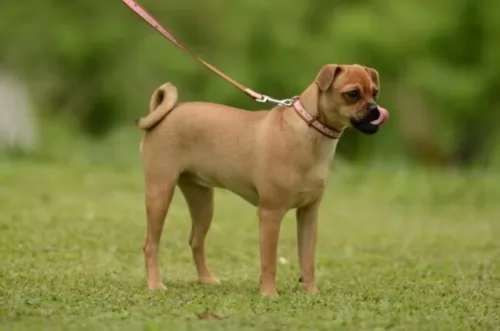 The Muggin is not a purebred dog but rather a cross breed. The hybrid dog population has exploding in the United States in the past ten to fifteen years. A lot of the success of crossbreeding can be attributed to the marketing of these dogs as “Designer Breeds”.
The Muggin is not a purebred dog but rather a cross breed. The hybrid dog population has exploding in the United States in the past ten to fifteen years. A lot of the success of crossbreeding can be attributed to the marketing of these dogs as “Designer Breeds”.
Designer breeds are developed because someone wants some of the characteristics of Breed X and some of the characteristics of Breed Y. Therefore, Designer breed XY is developed. In order to understand this hybrid dog, you need to understand the two purebred breeds they come from. The Muggin is the result of crossing the purebred Pug and the purebred Miniature Pinscher or Min Pin. So, we need to look at the origins of these two purebred breeds.
They are also referred to as Pin Pugs, Min Pin Pug, Pug Pin, Pugscher and were originally the Carlin Pinscher. However, these days there are other breeds besides the Pug and Min Pin making up the gene pool for the Carlin Pinscher. Because of this the Muggin has been separated from the Carlin Pinscher. The American Canine Hybrid Club has accepted the Muggin name for the Pug Min Pin cross.
Pugs are originally a Chinese breed and they were companions rather than working dogs of any kind. During the Han Dynasty they were the dogs of royalty. At the same time there were dogs very much like the pug in Japan and Tibet. The Pugs came to Europe by way of trades with the Dutch who then brought them to Europe. They were named the Mopshond and they caught the eye of the royalty in Europe as well.
Pugs were imported to the United States after the U.S. Civil War and in 1885 they were recognized by the American Kennel Club and called Pugs.
The Min Pin traces its origins to Germany a few hundred years ago. They were “ratters”, guarding the house and stables from all types of vermin. Most dog people believe that the Min Pin is much older than this, perhaps by thousands of years. Yet there is no detailed history to support that. Most believe the breed comes from the German Pinscher line. There might also be some Daschund and Greyhound in that line.
They were once called the Reh Pinscher. This was their name when they came to North America in 1919 and then the breed was renamed in 1972. The Miniature Pinscher Club of America was started in the early 1900’s while the AKC recognized the Min Pin in 1929. Today the Miniature Pinscher is a family dog, a companion.
The Muggin is a loving and loyal dog. All they want is for you to be happy and to share that happiness with them. They can also easily become a one person dog and bond intensely with that one person. They are not a hybrid that you can leave home alone while you go to work for 8 to 10 hours a day. No, the Muggin needs attention and lots of it. Despite this they are great with both kids and other dogs.
Because they are a cross breed, they are not recognized by the American Kennel Club. However, some hybrid registries do recognize the Muggin. These include the Designer Breed Registry, the International Designer Canine Registry, The Designer Dogs Kennel Club, the American Canine Hybrid Club, and the Dog Registry of America.
 Teddy Roosevelt Terriers (Teddy, American Teddy) are American hunting terriers related to American Rat Terriers and a host of other working, farm, hunting dogs initially brought by working-class immigrants from England and Europe. Largely due to the working nature of these dogs early the cross breeding was to reinforce useful traits like a superior ability to scent prey. It also bequeathed the breed with superior intelligence. While they take a while to warm up to new people, to their human family they like to be close all the time, and are eager to be with them and please them. Teddy's share their early history with American Rat Terriers, Fox Paulistinha, Tenterfield Terrier and Beagles. They also are related to Feist (dog), and Turnspit dogs, English White Terrier and Wry-legged terrier (all now extinct), as well as Bull, Smooth Fox, Manchester Terriers with Beagles, Italian Greyhound and Whippets in the mix.
Teddy Roosevelt Terriers (Teddy, American Teddy) are American hunting terriers related to American Rat Terriers and a host of other working, farm, hunting dogs initially brought by working-class immigrants from England and Europe. Largely due to the working nature of these dogs early the cross breeding was to reinforce useful traits like a superior ability to scent prey. It also bequeathed the breed with superior intelligence. While they take a while to warm up to new people, to their human family they like to be close all the time, and are eager to be with them and please them. Teddy's share their early history with American Rat Terriers, Fox Paulistinha, Tenterfield Terrier and Beagles. They also are related to Feist (dog), and Turnspit dogs, English White Terrier and Wry-legged terrier (all now extinct), as well as Bull, Smooth Fox, Manchester Terriers with Beagles, Italian Greyhound and Whippets in the mix.
Only since 1996 have Teddy Roosevelt Terriers had standards set for the breed. The major difference between Teddys and the related American Rat Terrier is Teddys are closer to the ground (bench-legged), have greater bone density and more muscle. Teddys are medium to small sized. It was in the mid 1990's that the effort began to breed only the shorter legged phenotype into the Teddy lineage and allow the rat Terrier to be the longer legged variety. The UKC (United Kennel Club) and AKC (American Kennel Club) both recognize Teddys, the UKC since 1999.
The Rat Terrier Club of America separated the long legged and short legged varieties, the short legged ones were named in honor of President Theodore Roosevelt. It is rather interesting that President Theodore Roosevelt, while being very fond of his family dogs did not own any Rat Terriers, and did not help develop the breed that bears his name. He mentions dogs in several of his letters, Skip who rode with the president on his horse while hunting and belonged to a friend, Scamp who lived with the Roosevelt's in the White House and hunted and caught rats and their dog Jack.
 As previously mentioned, the Muggin is a cross between the Pug and the Miniature Pinscher. They are small, shave sturdy legs, floppy ears, and a wrinkled forehead for the most part. Like all hybrids however, all first generation dogs do not look the same. Some might resemble the Min Pin more and others the Pug. Some might have the stockier body of the Pug and the short tail of the Min Pin. Or one could have the Pug’s curly tail and the athletic body of the Min Pin. The snout can be short or long, the ears heavy and floppy or small and thin.
As previously mentioned, the Muggin is a cross between the Pug and the Miniature Pinscher. They are small, shave sturdy legs, floppy ears, and a wrinkled forehead for the most part. Like all hybrids however, all first generation dogs do not look the same. Some might resemble the Min Pin more and others the Pug. Some might have the stockier body of the Pug and the short tail of the Min Pin. Or one could have the Pug’s curly tail and the athletic body of the Min Pin. The snout can be short or long, the ears heavy and floppy or small and thin.
Their coats will usually be fine and short, and colors can vary a lot. They might be black and tan like a Min Pin, or more like a Pug with a solid color of cream, brown, black, white or golden. They also tend to shed quite a bit no matter which parent they take after the most. They will either have brown noses and black eyes or brown eyes and black noses or any combination of black and brown.
If Muggins are only bred to Muggins the second and third generations will resemble each other more than the first generations will. However, at this point many breeders will try to strengthen the breed by occasionally adding in to the gene pool other dog breeds.
 Teddy Roosevelt Terriers are hunting terriers that are short legged, well muscled and very active. They have proportionate wide, sightly rounded heads cuneus (wedge) shaped on which the V shaped ears are set on the outside edge. Their ears may be button or erect, and breed standards prefer a docked tail, but it is not necessary. Ideally Teddy's have length/height ratio is 10/7 or 10/8. The Teddy Roosevelt Terriers coats may be solid white, other colors with patches and markings. Their coats are short and rough. Because they are working dogs, what is termed as “honorable” scars from work are not deducted from the dogs points. If the dog is not proportionate to breed standards (for example long legs or square body) it may be disqualified, but exaggerations and faults are marked only is in as much as it interferes with the ability to work. They are very pleasant looking and have a lively manner.
Teddy Roosevelt Terriers are hunting terriers that are short legged, well muscled and very active. They have proportionate wide, sightly rounded heads cuneus (wedge) shaped on which the V shaped ears are set on the outside edge. Their ears may be button or erect, and breed standards prefer a docked tail, but it is not necessary. Ideally Teddy's have length/height ratio is 10/7 or 10/8. The Teddy Roosevelt Terriers coats may be solid white, other colors with patches and markings. Their coats are short and rough. Because they are working dogs, what is termed as “honorable” scars from work are not deducted from the dogs points. If the dog is not proportionate to breed standards (for example long legs or square body) it may be disqualified, but exaggerations and faults are marked only is in as much as it interferes with the ability to work. They are very pleasant looking and have a lively manner.
Teddy Roosevelt Terriers are happy when they are the constant companion of their owner(s) and will shadow their master all day. Temperamentally they love to play, do well in obedience training and are territorial and protective and are exceptional watch dogs. Of course, they were bred as hunting dogs and have hunting instincts, a greater than median prey drive and will chase anything they consider prey such as rabbits, squirrels, birds, stray cats, (and if not trained poultry), as a working dog training is really important. With a heightened sense of smell and superior prey drive, Teddy's have been observed to follow and dig along mole trails (adding further damage to what the moles may have already inflicted), as well as ferret out edible mushrooms.
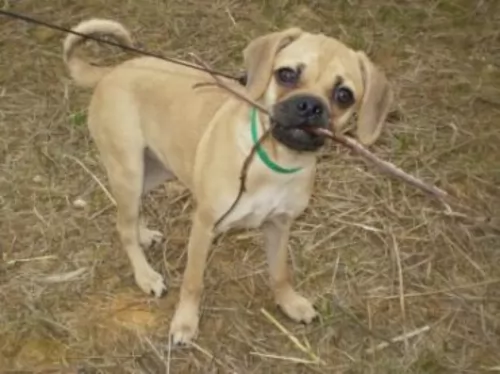 They are good with children but should be supervised.
They are good with children but should be supervised.
Energetic and loving little dogs.
Very adaptable if taken for walks or has space in a yard. Can live anywhere under those circumstances.
Very intelligent but strong willed dog. Needs strong leadership from their person.
 1.Children friendliness yes Teddy's love to play and enjoy children. Enjoys spending time with family and interacting with their human family taking part in the everyday routines.
1.Children friendliness yes Teddy's love to play and enjoy children. Enjoys spending time with family and interacting with their human family taking part in the everyday routines.
2.Special talents The breed has high prey drive and an very intense sense of smell One of their talents is to be trained to find, by scent, Black Truffles (a type of edible mushroom) found close to the roots of some trees in the Western half of North America.
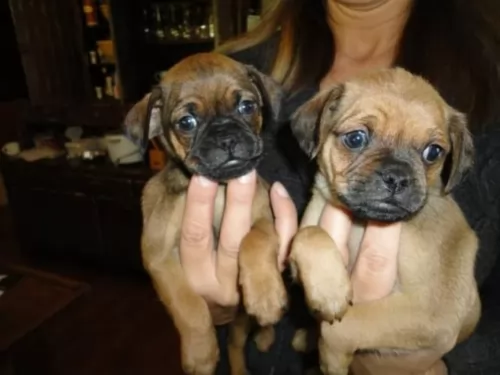 The first generation of Muggins may face all the health issues of either or both their parents, while second and third generations tend to have less health issues, They types of issues the first generation of Muggins might face include:
The first generation of Muggins may face all the health issues of either or both their parents, while second and third generations tend to have less health issues, They types of issues the first generation of Muggins might face include:
Nerve Degeneration – Degenerative Myelopathy or Dm – causes paralysis and eventually fatal.
 • Ectopia lentis a congenital problem where the lens of the eye is displaced. Eye disease
• Ectopia lentis a congenital problem where the lens of the eye is displaced. Eye disease
• bite problems (malocclusions -teeth that are incorrectly aligned when jaw is closed.),
• Hip dysplasia, elbow dysplasia, (hip or elbow socket that does not fully cover the ball which increases the risk of displacement.
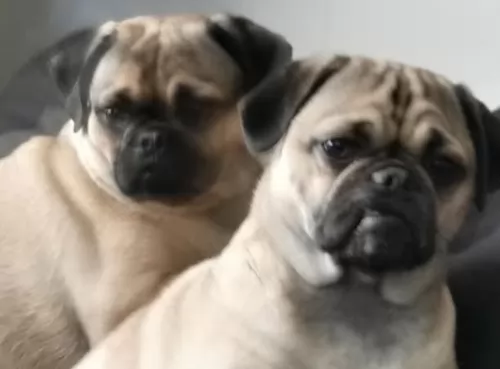 This crossbreed has a definite propensity to overeat and become obese from puppyhood. Feed the puppy a small dog dry food 3-4 times a day a total of ¾ of a cup to 1 cup.
This crossbreed has a definite propensity to overeat and become obese from puppyhood. Feed the puppy a small dog dry food 3-4 times a day a total of ¾ of a cup to 1 cup.
Again don’t over feed the adult Muggin or he will become obese easily. Feed at least twice a day one to one and half cups total.
High Energy
With the athleticism of the Min Pin taking precedence over the less active Pug, the Muggin is a fairly active dog. The Muggin is also not effective by the Pug’s difficulty with heat and cold. They love to go on long walks and need exercise to keep from being bored and destructive. However, remember there is a Pug in your Muggin and if she is not into exercise don’t try to get her to do more than she can.
You do want your Muggin to get enough exercise to fend off any tendency to be overweight. They are good at agility, jogging, obedience and watchdog activities.
 1 Feeding the puppy Puppies should eat a minimum of a cup and max of a cup and three quarters each day. 1-13/4
1 Feeding the puppy Puppies should eat a minimum of a cup and max of a cup and three quarters each day. 1-13/4
2.Feeding the adult Adult Teddy Roosevelt Terriers should eat three-fourth to one-and-a-half cups per day.
3.Points for Good Health - fairly healthy The Teddy Roosevelt Terriers displays some common joint issues that are shared by Rat Terriers.
4. Games and Exercises Having descended from hunting/working dogs Teddy Roosevelt's are able to learn and work conformation rings, and agility trials. They like to play and take part in swims, hikes and playing fetch or Frisbee. They take well to obedience training.